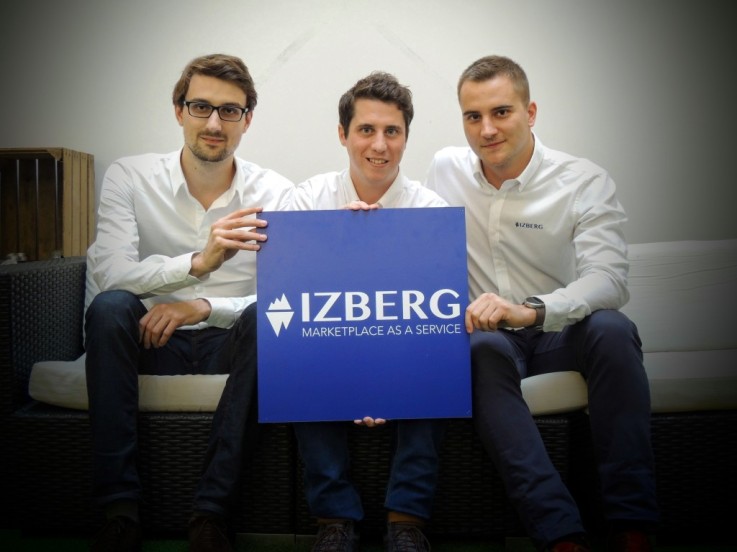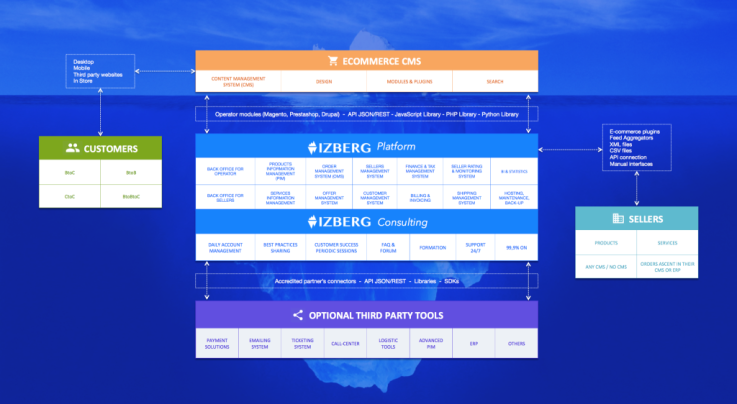We talk to Benoit Feron from IZBERG about marketplace technology and how it’s gaining traction in the service industry

A technical leader in e-commerce solutions for marketplaces, IZBERG Marketplace allows companies to enter the world of online selling and become e-business leaders. We talked to Benoit Feron, IZBERG’s Co-Founder and Head of Sales, Business Development and Public Relations, on the platform and ever-growing position marketplaces hold in retail.
Can you briefly clarify what IZBERG do?
IZBERG is a SAS solution. We can turn any website, any mobile application, into a multi-selling platform. Our solution is a technical solution that you can plug on your web site or mobile app and it will allow you to onboard some third party suppliers directly within the IZBERG. We empower our clients to turn their activity into an online marketplace by aggregating all the suppliers that they want on their website and take a commission on every sale that happens through this marketplace.
How was the business founded, and what was the inspiration behind it?

We are three co-founders and we created the company four years ago. At that time, the company wasn’t called IZBERG. We created a technology that was analysing the behaviour of consumers on a certain web site, and to show them only products that they would love. We decided to apply it to fashion for women. The next step was to allow these people to buy the product, and the best way to allow these people to buy products directly within our own website was to create a marketplace.
So we decided to put lots of our research and development into creating marketplace technology for our own purpose. People started to contact us to say, “how did you do that. Do you sell your technology?” Then we realised that it was the right time to release another product which would be our technology, but we could sell to other companies. We operate our own marketplace so we know all the challenges that marketplace operators who are our clients face. We know how to advise them because we did the job ourselves before. So we not only bring technology to the table but we also bring all the consulting and marketplace expertise to guide them and to advise them on how to do things and make as much money as possible.
What would you say the key challenges are to having a successful marketplace?
In my opinion, the marketplace success relies on three pillars which are very similar to the ones within e-commerce. Having a great product catalogue, having good prices and the perfect customer service. These are done automatically through the marketplace because the marketplace allows you to onboard all these external sellers that will bring their product to your website and improve your product catalogue size. Sellers will directly compete against each other with the price and the customer service.
But the first challenge is to reach this critical mass. If you want to have lots of clients on the web site you need to have lots of sellers. If you want to have lots of sellers you need to have lots of clients. So this is one of the first challenges that you might have. What we usually say to our clients is, if you want to solve this problem, you need to first onboard the sellers. To do so, you need to ease the process by providing them with a pure business model based on performance. It means that you only take a commission on every sale and don’t make them pay to be listed on the marketplace. It’s easier for them to accept. Then later on, when you get bigger, it’s easier to onboard sellers because they all come to you and say I want to sell on your website. But at the beginning it is easier to have a business model based on pure performance.
The second biggest problems are the technical issues when creating a marketplace internally. If someone wants to create their own marketplace, it’s going to be very costly and very time consuming. You need to hire a whole team of research and development engineers. It’s said that to create a marketplace internally, you’re going to take between a year and two years to develop it entirely.
People think that when you talk about marketplaces, you’re taking about marketplaces for products. But nowadays the biggest trend is marketplaces for services. It’s companies like Airbnb for example. Airbnb is not selling anything. It just allows you to rent the place. Uber is not selling cars, they just allow you to rent a car through a certain service. The next thing is going to be allowing the retailers and all the brands to really capture the whole value for the client. Mixing products and services at the same time. It could be IKEA adding on a service marketplace at the end of their things. They sell you a table and then offer you a choice of five people to come round and construct it for you.
How can brands control who they do and don’t stock/ represent?

Through the IZBERG technology the marketplace operator has full control over everything that happens on the marketplace. So when a third party supplier is going to upload a product catalogue, the marketplace operator can decide to display or not display the product on their front end. So you can rework the data and you can choose and validate through dedicated validation workflows which products will be displayed on the website. It’s not like on eBay, where you can upload any kind of product.
Is that one of the challenges that you come up against with people?
When you want to create your marketplace, you need to have control over what’s happening. You can also put some guidelines for the sellers saying, “I need at least three pictures for the product. I need a product description that is at least 100 words.” Whatever you want. But you can customise all this data and all of these needs to make sure that the sellers fit with the expectations that you have.
In terms of brands using this currently in really interesting and innovative ways, can you tell me who’s leading the way?
You’ve got two kinds of marketplaces. You’ve got the existing company that wants to create a marketplace and you’ve got the pure players, the ones that really create the company to operate the marketplace. Usually the most innovative companies are the ones that really create their company just to operate the marketplace. Uber for me is the best example. Why? Because they’ve got one million drivers around the world. The drivers are not employees of the company. Uber do not own any cars, but they are the biggest taxi company in the world. They disrupted the market in such a quick and impressive way.
For me, the strength of the marketplace is allowing someone to gather all the retail sellers, all the little e-commerce companies, on one single platform. In France we’ve got 170,000 e-commerce websites and only 6% of them are generating more than €1,000,000. So it’s about gathering all of these retail sellers that struggle to get online because it’s expensive, and putting them on a single platform where we manage the traffic acquisition and help them ship the product when a sale is made. That’s what our clients are doing in the horse racing industry, in the online medicine industry, in the fashion industry. But for me the most innovative marketplaces today are Uber and Airbnb.
Can you think of any other markets, especially in the service space, that haven’t yet been tapped into that are ripe for someone to come along and offer a marketplace and be the next Airbnb?
I did a conference last week in Monaco in the south of France about marketplaces for services. The industry is getting quite, not crowded, but every segment of the industry is hydrated by the marketplace. The business to business industry is the next one for me that’s going to be addressed. Especially the marketplace for services.
When you buy, for example, product or equipment to put in your hotel, you don’t want someone to deliver the product within your hotel lobby for you to have to install them yourself. You want someone to deliver the product and then you want someone that comes in and installs everything. You can always buy products yourself. You can be an e-commerce company, you can buy products, you can stock products and when you sell them it’s good. But you cannot stock services, you cannot stock human time. And that’s why it’s so expensive and so complicated to operate service in the service industry.
How are potential clients responding to your product?
I guess it’s different from one market to another. In France, the marketplace industry is very mature. Among the 15 biggest e-commerce companies in France, 11 are their own marketplace. It’s not about how and why we should do it. It’s more about when and what’s the strategy behind the marketplace.
In the UK for example, I noticed that people usually buy from a marketplace but they don’t always see them as marketplaces. Like ASOS Marketplace, Hassle.com or Uber. People don’t picture them as marketplaces. So in the UK we notice that we need to educate people a bit about the marketplace environment. They buy on these marketplaces, but don’t realise that it is a marketplace. This is quite good as it means the marketplace is doing a good job. It shows that you’ve got good branding, good positioning and that people are feeling trust when they buy on these platforms.
If we fast forward maybe 5 or 10 years, how do you envisage e-commerce operating?
What we started to notice a few years ago is getting more and more intense on the omnichannel scene. Like booking something online and going to get it in the shop. Or looking for something in the shop and getting it delivered to your house. Uber rely 100% on the mobile industry. So for me that’s something. Omnichannel, mobility, and the fact that you can buy from everywhere at any time is going to remain in the future.
I also think it’s going to be more about industries rather than brands. So you have maybe 1000 industries that you can digitise online per country. And each of them, for me, is going to go on the marketplace. Just in the fashion for women industry, online, I can give you 10 marketplaces. You can take fashion for kids, fashion for pregnant women and all these segments, all these niche market, will be addressed by the marketplace.
How do you think digital marketplaces might integrate more with physical stores? Do you have plans to develop your model with this in mind?

Within our solution people can already bring location, so that’s something that we already do. On our road map the main chapters in the coming months and years is the services industry, because we want to go more and more in depth. The B2B industry is also something that we are looking a lot at. Because it’s, again, such a big industry. And then connecting physical stores, connecting warehouses and the Internet industry is a transversal challenge for us.
We also want to be the central piece of the internet ecosystem for our clients. By that I mean we want to be a hub, where you’ll be able to plug in your own solutions, your own emailing solution, your own call centre solution, because everything is related to the marketplace. So this is where we picture IZBERG. We are the masterpiece, the central piece among all these internet maps that you have for every one of our clients.
Want to quickly and easily connect with the players kick-starting trends and inventing the future of retail? Find out how you can transform your team’s thinking using Insider Trends’ little black book here
Images courtesy of Benoit Feron



